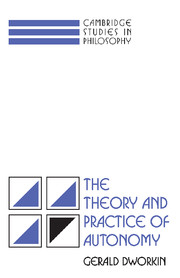Summary
The will is therefore not merely subject to the law, but is so subject that it must be considered as also making the law for itself and precisely on this account as first of all subject to the law (of which it can regard itself as the author).
Kant, The Metaphysics of Morals[Virtue] is not a troubling oneself about a particular and isolated morality of one's own … the striving for a positive morality of one's own is futile, and in its very nature impossible of attainment … to be moral is to live in accordance with the moral tradition of one's own country.
Hegel, The Phenomenology of Spirit1. There is a philosophical view about morality that is shared by moral philosophers as divergent as Kant, Kierkegaard, Nietzsche, Royce, Hare, Popper, Sartre, and Wolff. It is a view of the moral agent as necessarily autonomous. It is this view that I wish to understand and evaluate in this essay. I speak of a view and not a thesis because the position involves not merely a conception of autonomy but connected views about the nature of moral principles, of moral epistemology, of rationality, and of responsibility.
2. I shall begin by distinguishing a number of ways of explicating the notion of moral autonomy. In the philosophical debate very different notions have been confused, and because they are involved in claims that range from the trivially true to the profoundly false it is essential to distinguish them.
- Type
- Chapter
- Information
- The Theory and Practice of Autonomy , pp. 34 - 47Publisher: Cambridge University PressPrint publication year: 1988
- 1
- Cited by

